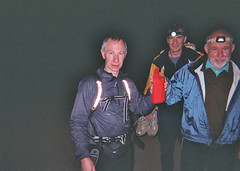In the 25/5/2006 Fortnightly Mailing I pointed to an interview on the BBC web site with Will Wright, the creator of "The Sims".
Thanks to Dick Moore for sending me the these two videos. The first is of an hour-long talk by Will Wright at the Games Developer Conference in San Fransisco in March 2006, to an (adulatory) audience of games developers. His basic argument is that when games are played by masses of people, even if only a small proportion players make content, and even if only a small proportion of this "user-generated" content is any good, more high quality content will be generated by users than could ever conceivably be made by the games-development companies themselves.
The second is a 30 minute description by Wright of Spore - basically a video, with Wright's voice-over, of the Spore "world", the kinds of creatures that populate it, the tools available to players to create content, and an overview of the technology underpinning it. (For me it brought back memories of a rather unpleasant shrimp (Triops australiensis) one of my children once grew from eggs bought in kit form from the Natural History Museum. There were several shrimps to start off with, but they were vicious cannibals.)
You can find out a bit more (but not much more) about user-generated content from Caryl Shaw's Building Community Around Pollinated Conted in Spore by [9 MB PPT], from the same conference.


The nature and value of formative assessment for learning
Link rot fixed using WebCite, with minor edits, 11/5/2011
This 2004 paper [72 kB PDF] by Paul Black and Christine Harrison, with the King’s College London Assessment for Learning Group, is in the same vein as Inside the Black Box - Raising Standards through Classroom Assessment [PDF]. The latter influenced me a lot, in particular when working with David Jennings in 2003 on BS8426 - A code of practice for e-support in e-learning systems. (BS8426 is absurdly overpriced, but this 8 page CC overview covers quite a lot of it.) Here is the abstract in full:
Posted on 04/07/2006 in News and comment, Resources | Permalink | Comments (0)
|